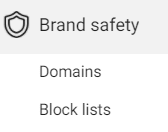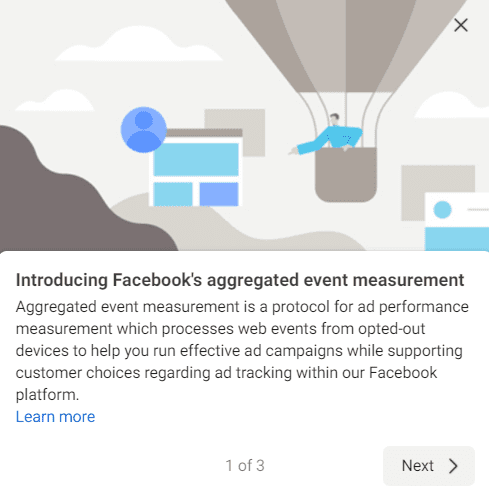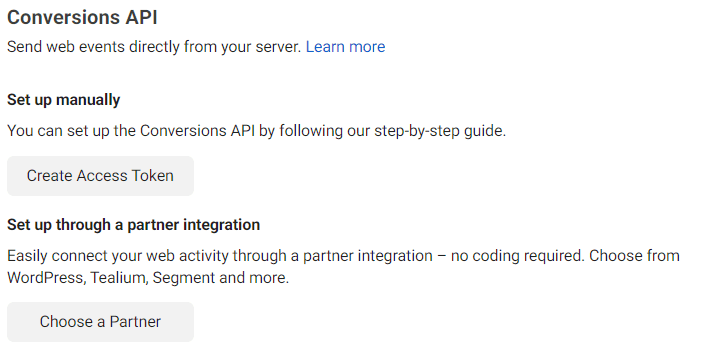If you have used Facebook’s advertising platform in the past three months, you may have seen a few changes happening.
Firstly, the constant warning that the Apple iOS update will change the way Facebook receives and processes events from tools such as the Facebook Pixel.
Secondly, the introduction of the ‘Resource Centre’, a new tab in the ads manager which provides you with a list of tasks to get you ready for the Apple iOS 14 update.
And finally, the fact that your Facebook conversion events appear a little lower than usual and you’re unable to assign them to campaigns. This is the most concerning one.
Unfortunately, this marks the start of a new era for Facebook advertising. So, what exactly is this iOS update all about, how will it affect your ads and what should you do about it?
In a nutshell
Apple has announced a new feature with iOS 14 designed to provide their users with more privacy. Each app on the store will now be required to ask users if they would like to opt in or out of data collection.
Though these controls have always been available, they were previously hidden. As this new prompt appears when the app is downloaded, it is expected to encourage majority of users to opt out of data tracking.
This will affect all social media platforms, not just Facebook. The users who have opted out will no longer be tracked or reported on when it comes to social media advertising and their data will no longer be available to use for remarketing.
Prior to these changes, the Facebook pixel worked to track the actions of users who clicked from the advert to the website. It measured what types of events they triggered and if it resulted in a conversion.
On top of that, it also tracked what other websites they went on and used that information to sort people into different interest areas and demographics for advert personalisation.
Apple has made this change to follow its approach of reducing automated tracking, similar to the changes it made to Safari back in 2017.
They maintain their stance that this is best for the user, but many advertisers are suspicious as to their reasons for this change. (Start the countdown to Apple announcing its new advertising platform/search engine using the data only it can see…).
Should we be worried?
It’s inevitable that this update will lead to a loss of data. Here are a few areas that will be impacted by this change:
Tracking advert performance
Not only will Facebook campaigns not be able to report on users who have opted out of tracking, but we will also be unable to see if they converted on the site.
Being unable to track if your social ads are contributing to conversions will make the adverts appear as though they are not working as well as they were before.
Attribution window
Facebook’s attribution windows are being reduced from 28 days to seven days. This means that before the update, if a user clicked an advert and converted within 28 days, the conversion was attributed to the advertising campaign.
The reduction to seven days will lead to fewer conversions attributed to your Facebook campaigns, which reduces how many conversions campaigns receive.
User interests
The pixel has been so widely used, which has allowed Facebook to provide highly detailed demographics and interest targeting options. Being able to track what users liked to do on different platforms allowed them to be slotted into different ad personalisation categories.
This change will stop the communication between different websites and will ultimately lead to Facebook’s audience targeting becoming less effective. Ads will likely be served to people who are less relevant and this may lead to an increase in cost-per-click for campaigns.
Remarketing
If you’ve used remarketing on Facebook, you’ll know it is one of the best ways to reach highly relevant users and reduce the cost per conversion. Remarketing is based on being able to track what users did before on your website (e.g. visited, converted, abandoned basket and so on) and serve them another advert convincing them to come back.
Being unable to track some users will reduce the size of the audience pool for remarketing and will likely make this audience group less effective. The same goes for lookalike audiences (an audience who have similar characteristics to your original remarketing audience) based on who has visited your website before. If the initial pool is smaller, the lookalike audience will be too.
What do we have to do?
This all sounds very doom and gloom, doesn’t it? However, Facebook has some plans to make up for this loss of information and has been rolling them out over the past couple of months since the update.
Domain verification
Facebook recommends that each business verifies its website domain. This was always available as an option but was typically used by businesses that wanted to change the images shared with their links amongst other things.
Domain verification will now allow you to prove your business is legitimate and start to track events happening on the website via the conversion API rather than the pixel.
To verify your domain, go to business manager.
Select Brand safety.

Select Domains.
Here you will be able to add your business’ domain by following the steps. Domain verification can be done either through the DNS, adding a file to the root directory or through a meta tag.
Select events to track for your domain
Once the domain is verified, Facebook’s new Aggregated Event Measurement will allow you to select the events that matter the most to your business. Each domain can only track eight events, which then need to be sorted by priority order.

This can be done by visiting the Events Manager.

Select Aggregated event measurement.

Select Configure Web Events.

If your domain is verified, it will appear here. Select your business’ domain and click manage events.
Here you can select the pixel being used and the events your business cares about.

Once the Apple updates have fully taken place, advertisers will no longer be able to select which events are tracked here and Facebook will do it automatically.
So, we’d recommend you choose yours as soon as possible.
Set up the conversion API
The conversion API is not a complete solution to the tracking issue, but it will allow more data to be tracked than the current Facebook pixel.
Instead of relying on cookies to track the events in the browser, the Conversion API tracks events that hit the server and can then pass them back to Facebook. This will allow data from users who have opted out of tracking to still appear within Facebook.
To set up the conversion API, go to events manager. Click settings and scroll down to conversion API.

Here, you can either select create access token. This will take you through a guide on how to implement it manually (side note: you may need developer help).
Or, you can select choose a partner. The conversion API can be set up directly through a few partners, including Zapier, WordPress, WooCommerce, Shopify and more. This method will require you to install the Facebook app on your website’s CMS and to follow the steps through that method.
It’s expected that the Conversion API will eventually replace the Facebook Pixel, so the sooner this is set up the better!
To conclude
The Facebook Apple iOS update is a big change, but there are things we can do to minimise its’ impact. Advertisers need to make sure they’re aware of the update and take the above steps to be as prepared as possible.
Data will be lost and the results of campaigns may look different to before, so communicating this effectively to clients is key to ensuring your social advertising strategy does not look like it’s fallen off a cliff.
Advertisers are nothing if not skilled at thinking outside of the box. This change isn’t the first and won’t be the last, so we expect this update will ultimately lead to more thoroughly thought out campaigns.
Minimally, first hand remarketing lists will become increasingly important, so campaigns to drive collecting customer information (names, emails etc) will become even more useful and important.
Campaigns driven towards different device users may also become more popular and brand awareness campaigns will stop being as useful for generating remarketing lists.
Just keep your eyes peeled for the big reveal that Apple has found a brilliant new way to use this data…
If you’d like more information on how Spindogs can help with your Facebook campaigns, get in touch below. Our team of digital marketing experts are always on hand to help!